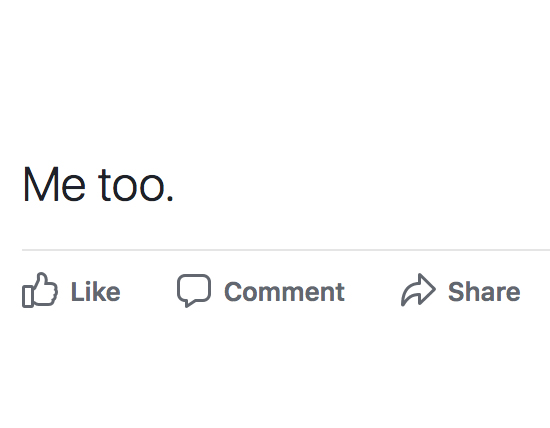Sexual assault campaign is problematic

Opinion columnist Brenna Wolfe discusses the recent “Me, too” social media campaign on Facebook in which users who have been sexually assaulted update their statuses accordingly, like the one pictured.
Oct 19, 2017
According to CBS News, on Tuesday, Oct. 17, there were 12 million Facebook posts, comments and reactions related to the “Me, too” campaign within 24 hours. This movement, started 10 years ago by Tarana Burke, was unknowingly ignited again by Alyssa Milano on Sunday evening, Oct. 15.
The purpose of the campaign is for victims and survivors of sexual assault or sexual harassment to post “Me, too” on social media. The instructions state, “If all the people who have been sexually harassed or assaulted wrote ‘Me, too’ as a status, we might give people a sense of the magnitude of the problem.”
First, let me say that this campaign was great for bringing awareness to an issue. I truly appreciate the movement. The “Me, too” campaign has been very successful, and I’m so happy that it has opened many eyes to the issues.
However, there are some problematic aspects of the “Me, too” campaign. First, a survivor may choose not to post “Me, too,” but that does not mean that they don’t exist or that their experiences aren’t valid.
There were millions of people who did not post “Me, too.” I see you, and I know you are here. Your experiences are true and valid.
Second, this movement is putting the responsibility onto survivors to disclose instead of responsibility on allies, society or perpetrators.
Lara Witt, an activist and feminist, said that “We shouldn’t have to out ourselves as survivors in order to grasp the magnitude of how systematic assault and harassment are.”
To be honest, I don’t know a single woman or girl who hasn’t been sexually harassed. All the women in my life have been sexually harassed multiple times. The campaign was successful in showing how systematic rape culture is, but why did survivors have to out themselves in order to make a difference?
Another problem I witnessed was people commenting, “Omg, are you okay?? What happened???”
The “Me, too” campaign was not so survivors would be interrogated about their experiences. A survivor can post their story if and when they want, not because they were bullied in the comments section to disclose. Don’t ask intruding questions; instead, show support for friends and family.
Lastly, a black woman named Tarana Burke started this campaign 10 years ago. It took a white woman in the public eye to create a worldwide movement.
Milano seemed to not be aware of Burke before she posted the first “Me, too.” Milano has acknowledged Burke since then. This speaks to another systemic problem of silencing women of color, and it is important to recognize this issue.
This was a great awareness campaign, but it was missing that action step. We need prevention.
Men, don’t say that you care because you have a mother or a daughter; say you are going to make change with your fathers, brothers, friends and sons. Allies and bystanders, let’s make a commitment to stand up when we see violent situations.
We, as a society, need to be educated on bystander prevention strategies, which works to change social norms that accept violence and empowers people to intervene with peers to prevent an assault from occurring.
Let us look out for one another to end rape culture. #It’sOnUS
For example, if a man is hollering at me on the Hill, I cannot stand up for myself because I may face retaliation or violence from that man. I do not have the power in that situation.
If a male bystander intervened and said “Knock it off, that’s not cool,” then most likely that hollering man would back off. If more and more bystanders acted this way, we would re-create our culture to respect women.
How can you, a UNI student, make this happen?
Attend a Mentors in Violence Prevention workshop. They will teach you the strategies on how to de-escalate a potentially violent situation.
If you see something suspicious, do something. Ask yourself: What would you want others to do if you were that person in this situation?
The best prevention strategy is comprehensive sex education. Teaching kids about a healthy sexual life and what consent looks like is the key to stopping sexual assault.
We can end rape culture, but only together.
















